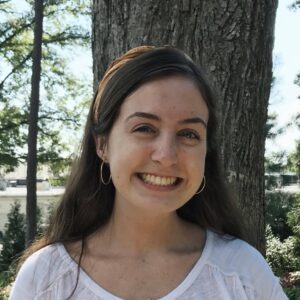Working as a Research Assistant at the N.C. Clean Energy Technology Center: Meet Sara Thornton
The N.C. Clean Energy Technology Center (“Center”) works with N.C. State University students as research assistants throughout the year to assist with project work. Sara Thornton, one of the current interns, has been with the Center since December 2019. She is an N.C. State University senior majoring in Electrical Engineering, with a concentration in Renewable Electric Energy Systems, and a minor in Environmental Science. Sara works on the Clean Power and Industrial Efficiency team along with other Center staff, including Isaac Panzarella, Art Samberg, Kimberly Conley, Ted Spencer and Simon Sandler. This team broadly identifies energy efficiency improvements, clean power solutions, and supports clients in achieving their energy and sustainability goals .

Interviewing Sara about her work experience at the Center, she said she sought an internship to expand her knowledge on renewable energy technologies and to see the bigger picture of how sustainability and engineering work together. Sara enjoys the technical engineering work of her classes, but she also likes to apply the regulatory and economic framework to that technical understanding. Sara added that “my engineering classes are focused on the back-end of energy systems, such as frequency regulation or transformers, and the internship at the Center has allowed me to see the broader, interdisciplinary connection of renewable energy systems.”
Sara has worked on multiple projects during the past year, but her favorite project so far has been a solar technical analysis. In this project, she analyzed clients’ utility data and rates to determine the appropriate size for a solar PV project. Sara researched data and performed calculations using a solar modeling tool called System Advisor Model to find out what system size was most economically feasible. With the support of Center staff, she was able to familiarize herself with common industry terms such as peak demand, rate of return, and capacity credits, expanding her knowledge of renewable energy and its associated economics in an applied fashion.
Another project Sara has enjoyed working on is the PV Pathways project, which remains in its infancy but will be a useful, streamlined tool that provides answers to questions about solar PV for different use cases and incentives. Residential customers, landowners, and other organizations call the Center asking how they should evaluate using solar PV, and PV Pathways aims to provide a framework for clients to begin their research on the feasibility of solar at their site. Sara has been able to have conversations with staff members at the Center to find what resources and incentive information would be most relevant to include in this tool, further broadening her own knowledge on the opportunities that solar provides.
Projects such as the solar technical analysis and the PV Pathways project are the perfect complement to Sara’s classroom education. These experiences have allowed her to explore the real-world applications of the material she learns in her electrical engineering courses and how these could translate as she enters her career post-graduation. The Center plays an important part in educating N.C. State students in the clean energy industry and in turn, students provide a valuable service in offering their talents on projects.
The N.C. State University moniker is “Think and Do” and the internship that Sara Thornton has held at the N.C. Clean Energy Technology Center illustrates this slogan perfectly.